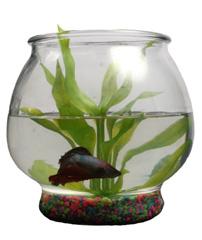In many cases, starting college means leaving old friends behind. And, while some friends can be reached on the phone or over the Internet, others don’t possess those means of communication.
Furry companions such as dogs or cats are not welcome in residence halls, but students can keep fish and other underwater creatures in tanks or bowls less than 10 gallons in volume.
Adam Hosterman, a senior in civil engineering, said he’s had a fish tank since his sophomore year in Lee Hall.
“It was just to have something to do productive in place of not having pets,” he said.
Hosterman said he started with a 10-gallon tank of goldfish, then expanded to a 60-gallon tank when he moved out of the residence halls.
“Now I have an Oscar and Jack Dempsey and pleco in one tank, and a half dozen hachet fish and some guppies in the small tank,” he said.
Danielle Jones, a junior in English, said she has a beta fish she keeps in a glass bowl.
“He’s a handful,” Jones said. “Takes up all my time and energy to watch him swim around and be scared of things.”
Many types of fish are both inexpensive and easy to care for. Eric Fortune, owner of Clearwater Aquariums, said he recommends beta fish for residence hall rooms based on tank size.
“No goldfish,” he said, about the pets in residence hall rooms. “You would need a bigger fish tank and a filtration system.”
Cost:
A beta fish costs $5 to $10 at a pet store, depending on its gender. Males are larger, but there are no other differences in their appearance. Prospective fish owners also need a tank, water conditioner and food.
The cost of keeping a fish is only $3 to $5 a month because initial supplies will last a long time.
SOURCE: Eric Fortune, owner of Clearwater Aquariums
Cleaning:
Fish owners need to clean a beta fish tank once a week and only need to change about 10 to 15 percent of the water. New water needs to be treated with a water conditioner because city water contains ammonia and chlorine, which can be harmful to the fish.
Source: Eric Fortune, owner of Clearwater Aquariums
Feeding:
Beta fish need to be fed a maximum of three times a week. According to petcaretips.net, overfeeding a beta fish can lead to an unsafe pollution level in the tank.
“You can leave a beta fish by itself for a week as long as the heat is not cut off,” Fortune said. The temperature in the tank needs to be 78 degrees.
Warning:
Do not put two beta fish in the same tank because they are fighting fish.
Source: Eric Fortune, owner of Clearwater Aquariums








